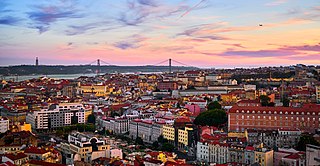
Lisbon is the capital and largest city of Portugal, with an estimated population of 544,851 within its administrative limits in an area of 100.05 km2. Lisbon's urban area extends beyond the city's administrative limits with a population of around 2.7 million people, being the 11th-most populous urban area in the European Union. About 3 million people live in the Lisbon metropolitan area, making it the third largest metropolitan area in the Iberian Peninsula, after Madrid and Barcelona. It represents approximately 27% of the country's population. It is mainland Europe's westernmost capital city and the only one along the Atlantic coast. Lisbon lies in the western Iberian Peninsula on the Atlantic Ocean and the River Tagus. The westernmost portions of its metro area, the Portuguese Riviera, form the westernmost point of Continental Europe, culminating at Cabo da Roca.
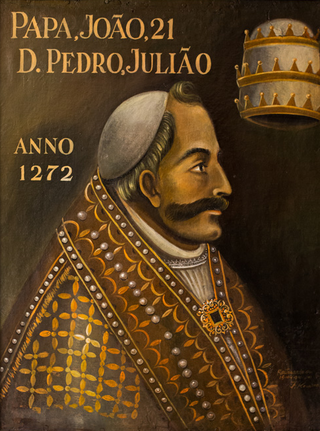
Pope John XXI, born Pedro Julião, was head of the Catholic Church and ruler of the Papal States from 8 September 1276 to his death on 20 May 1277. Apart from Damasus I, he has been the only Portuguese pope. He is sometimes identified with the logician and herbalist Peter of Spain, which would make him the only pope to have been a physician.

The Treaty of Rome, or EEC Treaty, brought about the creation of the European Economic Community (EEC), the best known of the European Communities (EC). The treaty was signed on 25 March 1957 by Belgium, France, Italy, Luxembourg, the Netherlands and West Germany, and it came into force on 1 January 1958. Originally the "Treaty establishing the European Economic Community", and now continuing under the name "Treaty on the Functioning of the European Union", it remains one of the two most important treaties in what is now the European Union (EU).

The Liberal Wars, also known as the Portuguese Civil War, the War of the Two Brothers or Miguelite War, was a war between liberal constitutionalists and conservative absolutists in Portugal over royal succession that lasted from 1828 to 1834. Embroiled parties included the Kingdom of Portugal, Portuguese rebels, the United Kingdom, France, the Catholic Church, and Spain.
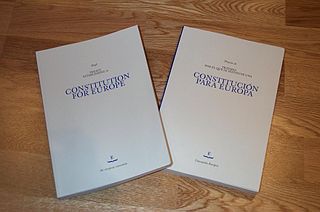
The Treaty establishing a Constitution for Europe was an unratified international treaty intended to create a consolidated constitution for the European Union (EU). It would have replaced the existing European Union treaties with a single text, given legal force to the Charter of Fundamental Rights, and expanded qualified majority voting into policy areas which had previously been decided by unanimity among member states.
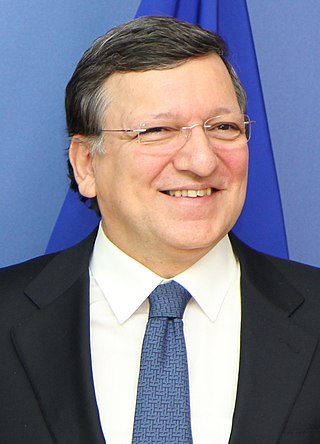
José Manuel Durão Barroso is a Portuguese politician and university teacher, currently serving as non-executive chairman of Goldman Sachs International. He previously served as the 11th president of the European Commission and the 115th prime minister of Portugal.

Mário Alberto Nobre Lopes Soares, was a Portuguese politician, who served as prime minister of Portugal from 1976 to 1978 and from 1983 to 1985, and subsequently as the 17th president of Portugal from 1986 to 1996. He was the first secretary-general of the Socialist Party, from its foundation in 1973 to 1986. A major political figure in Portugal, he is considered the father of Portuguese democracy.

The European Communities (EC) were three international organizations that were governed by the same set of institutions. These were the European Coal and Steel Community (ECSC), the European Atomic Energy Community, and the European Economic Community (EEC); the last of which was renamed the European Community (EC) in 1993 by the Maastricht Treaty establishing the European Union. The European Union was established at that time more as a concept rather than an entity, while the Communities remained the actual subjects of international law impersonating the rather abstract Union, becoming at the same time its first pillar. In the popular language, however, the singular European Community was sometimes inaccurately used interchangeably with the plural phrase, in the sense of referring to all three entities. The European Coal and Steel Community ceased to exist in 2002 when its founding treaty expired. The European Community was merged with the second and third EU pillars by the Treaty of Lisbon in 2009, finally allowing the European Union to move beyond being only a concept and to assume the shape of a legally incorporated international organization with juridical personality, designated as the legal successor to the Community. However, the reformed EU has not become entirely unified, because Euratom, though governed with the EU by the common set of institutions, has been retained as an entity distinct from the EU, along with a number of other international entities, such as the European Investment Bank, the European University Institute, the European Stability Mechanism, and the Unified Patent Court.
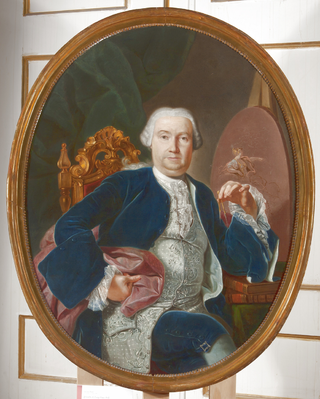
Luigi Vanvitelli, known in Dutch as Lodewijk van Wittel, was an Italian architect and painter. The most prominent 18th-century architect of Italy, he practised a sober classicising academic Late Baroque style that made an easy transition to Neoclassicism.
A supranational union is a type of international organization that is empowered to directly exercise some of the powers and functions otherwise reserved to states. A supranational organization involves a greater transfer of or limitation of state sovereignty than other kinds of international organizations.

The Patriarchate of Lisbon is a Latin Church ecclesiastical territory or patriarchal archdiocese of the Catholic Church in Lisbon, the capital of Portugal.

Infante Dom Afonso of Braganza, Duke of Porto was a Portuguese Infante of the House of Braganza, the son of King Luis I of Portugal and his wife, Maria Pia of Savoy. From 1908 to the abolition of the Portuguese monarchy in 1910 he was the Prince Royal of Portugal as heir presumptive to his nephew, King Manuel II.
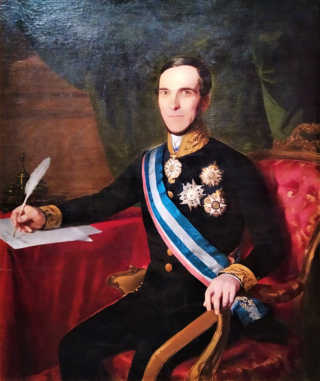
António Bernardo da Costa Cabral, 1st Count and 1st Marquis of Tomar was a Portuguese 19th century statesman.

The European Union (Amendment) Act 2008 was an Act of the Parliament of the United Kingdom. It gives effect in the law of the United Kingdom to the Lisbon Treaty, which was signed there by then-Prime Minister Gordon Brown on 14 December 2007. The Bill was first debated in the House of Commons on 21 January 2008, and passed its second reading that day by a vote of 362–224; Prime Minister Gordon Brown was absent that day, and left the Bill to be defended by then-Foreign Secretary David Miliband who introduced it to the House of Commons. A Conservative amendment led by the then Shadow Foreign Secretary William Hague to hold a UK-wide referendum on final approval of the Lisbon Treaty was defeated by the Labour Government in a Committee stage debate on 5 March 2008, by 311–248 in the House of Commons. The enactment via royal assent came on 19 June 2008. The Act does not actually ratify the treaty; it merely adds the Lisbon Treaty to the treaties listed in section 1(2) of the European Communities Act 1972. The actual ratification by the United Kingdom of the treaty took place when the British Government deposited the instruments of ratification in Rome on 16 July 2008.

The Twenty-eighth Amendment of the Constitution Act 2009 is an amendment of the Constitution of Ireland which permitted the state to ratify the Treaty of Lisbon of the European Union. It was approved by referendum on 2 October 2009.

The Treaty of Lisbon is an international agreement that amends the two treaties which form the constitutional basis of the European Union (EU). The Treaty of Lisbon, which was signed by the EU member states on 13 December 2007, entered into force on 1 December 2009. It amends the Maastricht Treaty (1992), known in updated form as the Treaty on European Union (2007) or TEU, as well as the Treaty of Rome (1957), known in updated form as the Treaty on the Functioning of the European Union (2007) or TFEU. It also amends the attached treaty protocols as well as the Treaty establishing the European Atomic Energy Community (EURATOM).

The ratification of the Treaty of Lisbon was officially completed by all member states of the European Union on 13 November 2009 when the Czech Republic deposited its instrument of ratification with the Italian government. The Lisbon Treaty came into force on the first day of the month following the deposition of the last instrument of ratification with the government of Italy, which was 1 December 2009.
Varthamanappusthakam is a Malayalam travelogue written by Paremmakkal Thoma Kathanar, a Nasrani Mappila kathanar of the modern-day Syro-Malabar Church. It is the first ever travelogue written in an Indian Language. It was written in the 18th century (1790) but then forgotten, being re-discovered in 1935 and first printed in 1936 by Luka Mathai Plathottam at Athirampuzha St Marys Press in the year 1936.

Italy–Portugal relations are the current and historical relations between the Italian Republic and the Portuguese Republic. Both nations are members of the Council of Europe, European Union, NATO, Organisation for Economic Co-operation and Development, Union for the Mediterranean and the United Nations.

















